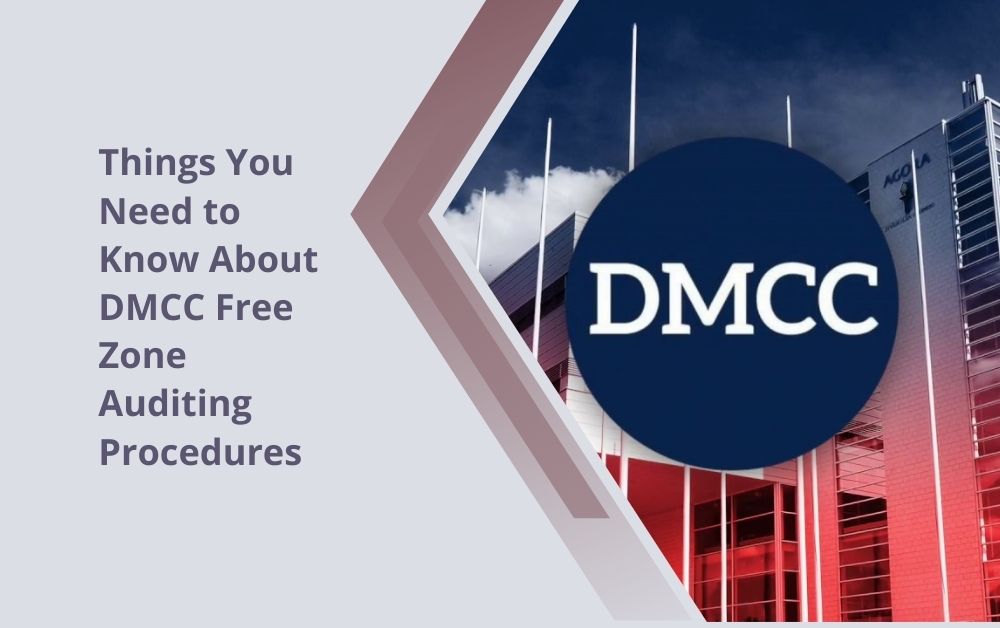Setting up a business in the Dubai Multi Commodities Centre (DMCC) Free Zone offers many advantages. These include a prime location, excellent infrastructure, and various incentives. However, like any other business area, companies in the DMCC Free Zone must follow specific rules and regulations. One of the most important regulations involves auditing procedures. This blog will help you understand everything you need to know about DMCC Free Zone auditing procedures, explained in simple terms.

What is the DMCC Free Zone?
Understanding the DMCC Free Zone
The DMCC Free Zone is a special economic area in Dubai, designed to attract businesses from all over the world. It offers many benefits such as:
- 100% foreign ownership: You don’t need a local partner.
- No personal or corporate taxes: This helps in saving money.
- Full repatriation of profits and capital: You can take your earnings back to your home country.
- State-of-the-art infrastructure: The facilities and services are top-notch.
Types of Businesses in the DMCC Free Zone
Businesses from various sectors operate in the DMCC Free Zone, including:
- Trading companies: They buy and sell goods.
- Service providers: They offer professional services like consulting.
- Manufacturers: They produce goods.
- Financial institutions: Banks and insurance companies.
Why Auditing is Important in the DMCC Free Zone
Ensuring Compliance
Auditing ensures that businesses comply with the rules and regulations of the DMCC Free Zone. Compliance is crucial to avoid penalties and legal issues.
Financial Transparency
Audits help maintain financial transparency. They provide a clear picture of a company’s financial health, which is essential for investors and stakeholders.
Building Trust
A clean audit report builds trust with clients, investors, and business partners. It shows that the company is well-managed and financially stable.
NOTE:- Ensure your business complies with all regulations and maintains financial transparency. Contact a DMCC Free Zone Approved Auditor today to schedule your audit and keep your operations running smoothly. Don’t wait—secure your company’s future with professional auditing services!
Types of Audits in the DMCC Free Zone
Internal Audits
What are Internal Audits?
Internal audits are conducted by the company’s own employees or an internal audit team. The purpose is to:
- Evaluate internal controls: Ensure that the company’s operations are efficient and effective.
- Identify risks: Spot potential issues before they become big problems.
- Improve processes: Suggest ways to enhance the company’s procedures.
Frequency of Internal Audits
Internal audits are usually conducted regularly, such as quarterly or annually. The frequency depends on the company’s size and complexity.
External Audits
What are External Audits?
External audits are conducted by independent auditing firms. These auditors review the company’s financial statements and provide an objective assessment. The main goals are to:
- Verify accuracy: Ensure that the financial statements are accurate and truthful.
- Evaluate compliance: Check if the company follows all relevant laws and regulations.
- Provide assurance: Give stakeholders confidence in the company’s financial health.
Importance of External Audits
External audits are critical for maintaining credibility. They provide an unbiased view of the company’s financial status, which is essential for investors, lenders, and regulators.
The Auditing Process in the DMCC Free Zone
Preparing for the Audit
Gathering Documents
The first step in the auditing process is gathering all necessary documents. These include:
- Financial statements: Balance sheet, income statement, and cash flow statement.
- Bank statements: Records of all bank transactions.
- Invoices and receipts: Proof of business transactions.
- Contracts: Agreements with clients, suppliers, and employees.
Organizing Records
Organize all documents systematically. This makes it easier for the auditors to review them. Ensure that all records are complete and accurate.
Conducting the Audit
Initial Meeting
The audit process usually starts with an initial meeting between the auditors and the company’s management. This meeting sets the scope of the audit and clarifies any questions.
Fieldwork
During the fieldwork phase, auditors review the documents and records. They may also interview employees and observe business operations. The auditors look for:
- Compliance issues: Any deviations from laws and regulations.
- Financial discrepancies: Inaccurate or incomplete financial records.
- Operational inefficiencies: Areas where the company can improve its processes.
Drafting the Report
After completing the fieldwork, the auditors draft a report. This report includes their findings, recommendations, and any identified issues. The company has an opportunity to respond to these findings.
Finalizing the Audit
Reviewing the Report
The final audit report is reviewed by both the auditors and the company’s management. Any necessary changes or clarifications are made.
Issuing the Report
Once finalized, the audit report is issued to the company’s management and relevant stakeholders. The report may also be submitted to the DMCC Free Zone Authority if required.
Implementing Recommendations
The company should implement the auditors’ recommendations to address any identified issues. This helps in improving operations and ensuring compliance in the future.
Common Challenges in the Auditing Process
Lack of Proper Documentation
One of the biggest challenges in the auditing process is the lack of proper documentation. Incomplete or disorganized records can delay the audit and result in unfavorable findings.
Non-Compliance with Regulations
Non-compliance with DMCC Free Zone regulations can lead to penalties and legal issues. Companies must stay updated with all relevant laws and regulations.
Resistance to Audits
Some employees or management teams may resist audits. They may see audits as intrusive or unnecessary. However, audits are essential for maintaining transparency and compliance.
Time Constraints
Audits can be time-consuming, especially for large or complex businesses. Companies must allocate sufficient time and resources to complete the audit process efficiently.
Tips for a Successful Audit in the DMCC Free Zone
Maintain Accurate Records
Keep accurate and complete records of all financial transactions. This makes the audit process smoother and quicker.
Stay Updated with Regulations
Regularly update yourself with the latest DMCC Free Zone regulations. Compliance with these regulations is crucial for a successful audit.
Cooperate with Auditors
Cooperate fully with the auditors. Provide them with all the necessary documents and information. Address their queries promptly.
Implement Internal Controls
Implement strong internal controls to prevent errors and fraud. Regular internal audits can help identify and address issues before the external audit.
Conclusion
Understanding the auditing procedures in the DMCC Free Zone is crucial for any business operating in this area. Audits ensure compliance with regulations, maintain financial transparency, and build trust with stakeholders. By preparing well, maintaining accurate records, and cooperating with auditors, companies can ensure a smooth and successful audit process. Stay updated with the latest regulations and implement strong internal controls to prevent issues and improve business operations.
For more insightful articles related to this topic, feel free to visit relxnn.com









